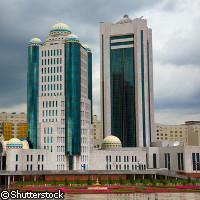Looking east: project builds bridges with eastern Europe and central Asia
Building bridges with the EU's neighbours in eastern Europe and central Asia is the goal of the EU-funded IncoNet EECA ('International cooperation network for Eastern European and Central Asian countries') project. The project is funded to the tune of EUR 3,549,999 under the International Cooperation budget of the Seventh Framework Programme (FP7). IncoNet EECA was launched earlier this year and it held its first brokerage event in the Kazakh capital of Astana in early December. The aim of the event was to raise awareness of the opportunities available to EECA researchers under FP7 and create links and forge partnerships between EU and EECA researchers in the areas of food, agriculture, fisheries and biotechnology research. The workshop attracted around 200 participants from across Europe and central Asia including scientists, policy makers and industry. Among them was the European Commission's Elisabetta Balzi, International Cooperation policy officer at the Biotechnologies, Agriculture and Food Directorate of the Research Directorate General. She was impressed by what she saw. 'Kazakhstan has a strong tradition in science,' she told CORDIS News, noting that the country plans to significantly increase its research spending in the coming years. It is already investing heavily in the construction of high-class new facilities and infrastructures. In the area of food and agriculture research, it is particularly interested in the areas of environment, animal health, food and biotechnology. Scientists in Kazakhstan and the rest of the eastern Europe and central Asia region are also increasingly reaching out to their colleagues in the EU. In the 4 years of the Sixth Framework Programme (FP6), 19 partners from EECA countries (including 1 from Kazakhstan) took part in agriculture and food research projects. In the first 2 years of FP7 alone, 33 EECA partners (including 2from Kazakhstan) have received funding to participate in EU-funded projects under the 'Food, agriculture and fisheries, and biotechnology' theme. According to Dr Balzi, Kazakhstan's success rate of 20% in applying for funding in her subject area is similar to that of many EU Member States. Projects such as IncoNet EECA should encourage more scientists from the region to make contact with researchers in the EU with a view to embarking on joint projects together. Meanwhile, the IncoNet EECA project will organise further workshops in the region on different topics. The project is also working on the establishment of a regional science and technology dialogue platform comprising representatives from the EU and its Member States as well as EECA partners.
Countries
Kazakhstan



